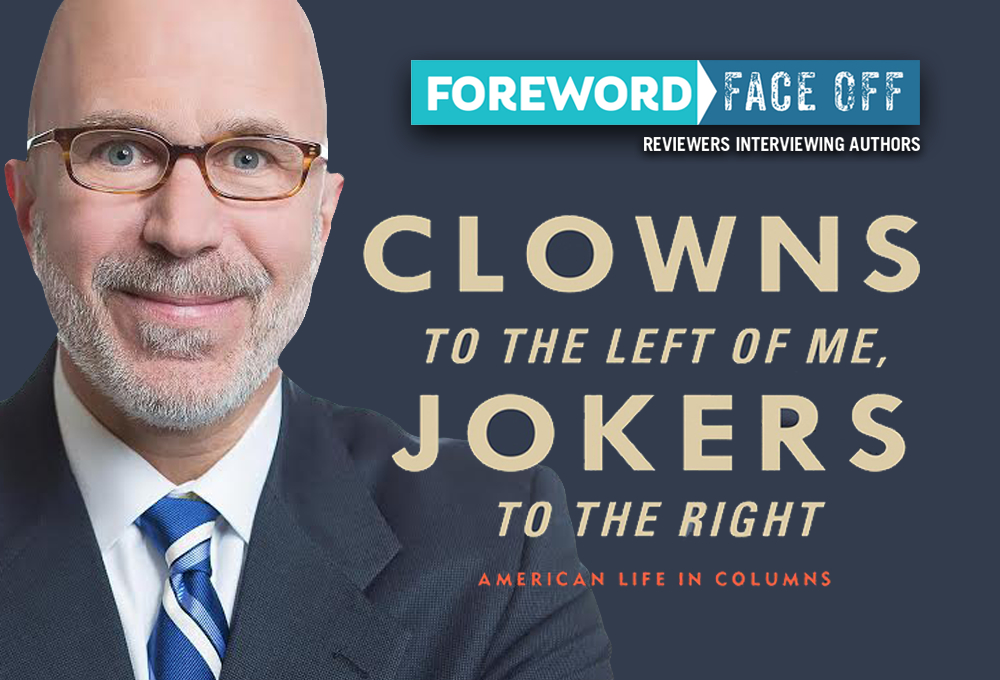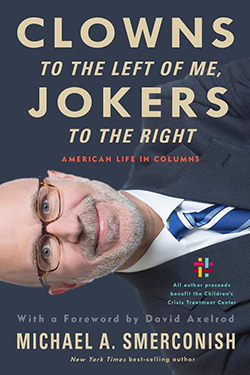Reviewer Joe Taylor Interviews Radio/TV Newscaster Michael Smerconish, Author of Clowns to the Left of Me, Jokers to the Right

When’s the last time you decided to read something political knowing it would anger you? Or watched a news program that made you want to throw the clicker at the television? The thing is, you should be proud of yourself if you do it regularly—your opinions will be all the more balanced if you know both sides of an issue.

Oh, to live in a country where Republicans and Democrats changed the channel more often instead of watching pundits who simply reinforce what they already believe. Oh, to live in a country where moderate politicians felt free to express their opinions even when it didn’t tow the party line.
Today’s Foreword Face Off brings us Michael Smerconish, one of the truly original voices of reason in the political world today. With Temple University Press releasing his new book, Clowns to the Left of Me, Jokers to the Right, in a few weeks, we asked reviewer Joe Taylor to chase him down for a grown-up conversation.\
Thanks guys, we needed that.
Here’s Joe’s review of Michael’s book.
In your columns, you seem to enjoy sharing information about yourself, especially if you can use personal information to argue a point or arrive at an insight. At times, your working-class upbringing and humility are evident. You don’t claim to be gifted or funny or loud. Instead, you write about how preparation and perseverance have served you. What other talents or attributes have helped your career in law, government, and media?
Let’s begin with the faults. My radio producer keeps an ever-expanding list of my idiosyncrasies that have made for good radio fodder.
I’m a bit OCD. Missing trash night is a huge deal at my house. I don’t like to read newspapers that have already been read, and when I get change at a convenience store, I want coins first. Get the picture?
My best attribute is probably my work ethic. I’ve always been willing to invest the time in the task at hand, whether it was working at McDonalds, serving in the Bush 41 Administration, readying for a trial, or preparing a radio program or newspaper column. Preparation is key. By the time I hit the air or begin to write the column, my work is largely over.
When discussing social and political problems, you often emphasize solutions. One problem you have stressed is the change in the media climate over the last thirty years, from “partisanship to polarization.” How can this situation be addressed to give citizens truly “fair and balanced” sources of information?
People need to change the channel. That might sound odd coming from someone who primarily earns his living on radio and television but that is what’s necessary. Never in our history have we been afforded so much choice in terms of where we get our news and information, and yet so few exercise those options.
Rarely do I go to bed the night before hosting a radio or television program without watching not only my own network, CNN, but also Fox News and MSNBC. I want to know what everyone is thinking and saying. Too many of us are in our silos interacting only with the like-minded, reinforcing preexisting viewpoints instead of challenging our thinking.
You often profile public figures you have met or worked with, such as Tim Russert, Jack Kemp, or Joe Frazier, reminding readers of their overlooked contributions or talents. Can you offer a short list of unmentioned notables, people in public life who have impressed you greatly?
Well, that is true, and while I have enjoyed writing those profiles, my favorites are often about real “characters,” which to me is a term of endearment. Philadelphia seems to have more than its proportionate share of interesting individuals who are not public figures.
One of my favorite columns concerns a classmate from junior high school who is now a farmer. He grows superb tomatoes. In another column, which also is included in the book, I wrote about a college professor who mentored me and eventually became a close friend.
You describe him in the book with his beard, “looking like Marx while speaking like Lincoln.”
Yes. I also loved relating the story of a practical joke on a friend in which a city councilman who was forty years my senior was my confederate.
One notable who has impacted me is comedian, writer, actor, producer Larry David. In his humor there is a great understanding of the human condition, and I try to keep his outlook in mind as I write and speak.
Most of your readers know that you left the Republican Party after voting for Obama’s first term, and that you take positions based on issues rather than party. Can you discuss your take on the state of things today? What issues truly concern you? Are you optimistic?
I am distressed at the incivility and polarization that I attribute to many causes, but chief among them, the outsized influence of men with microphones. Included in the book is a column about a speech I delivered a few years ago at the National Association of Broadcasters convention in Chicago. I warned that the business model being pursued by many AM stations was bad for business and bad for the country. I stand by what I told them. Many station managers and owners complimented me after the speech and agreed with me, but none made any monumental changes. That was before the rise of Trump. The tone of the political debate is being set by provocateurs, not party elders. That needs to change.
You have met and worked with great leaders like Reagan, Castro, and Obama, among others. But you have also met musicians: Cat Stevens, Led Zeppelin, and Ted Nugent are just a few. Where does your musical taste lie?
I am a classic rock fan. I still go to an occasional show, usually with my friend “Liberal Paul.” And when I get in his car, I will usually say, and I mean it, that we are too old for this. But inevitably we have a good time and we go again. In the book, I write about my longstanding love of the music of Pink Floyd and Roger Waters and get to tell a great story about spending time with Waters last year. That is why I loved writing the Afterwords. They enable the book to read more like a memoir than a simple compilation of columns.
Speaking of Afterwords, I very much enjoyed those commentaries. After each column in the collection, you reflect on what you wrote. You add context or bring readers up to date, with an occasional “mea culpa.” Can you comment on a few columns after which your thinking changed or evolved?
The first entry in the book is a guest opinion column I wrote for the Philadelphia Daily News in 1985 when I was still in law school. That was sixteen years before I began writing for the newspaper! In the column I extol the virtues of America as a land of opportunity. I tended to see things in rather black and white terms back then. I still think that America is a land of opportunity, but certainly with much more nuance that I believed when I was twenty three.
In another column, I doubted the initial charges against Bill Cosby. This was in 2005, a decade before he was charged with sexual assault and fifty women came forward saying “me too.” And I embraced the union of two men after reading a New York Times announcement of their nuptials, but at the time I did not use the word “marriage.” I even briefly bought into an Oklahoma City bombing conspiracy.
There are many things about which I have been mistaken or have had my thinking evolve over the years, and I have no problem airing them all out in the book. Perhaps my most notable disavowal was of my affiliation with the Republican Party. For three decades I was a reliable Republican voter and activist, but by 2010, having voted for Obama in 2008, I was done. I became an Independent.
Overall, the columns are set against the background of fifteen years in a post 9/11 world, and they chronicle changes in my thinking and changes I witnessed in my old political party. Did I change more than the party? It’s a debatable issue.
Joe Taylor
